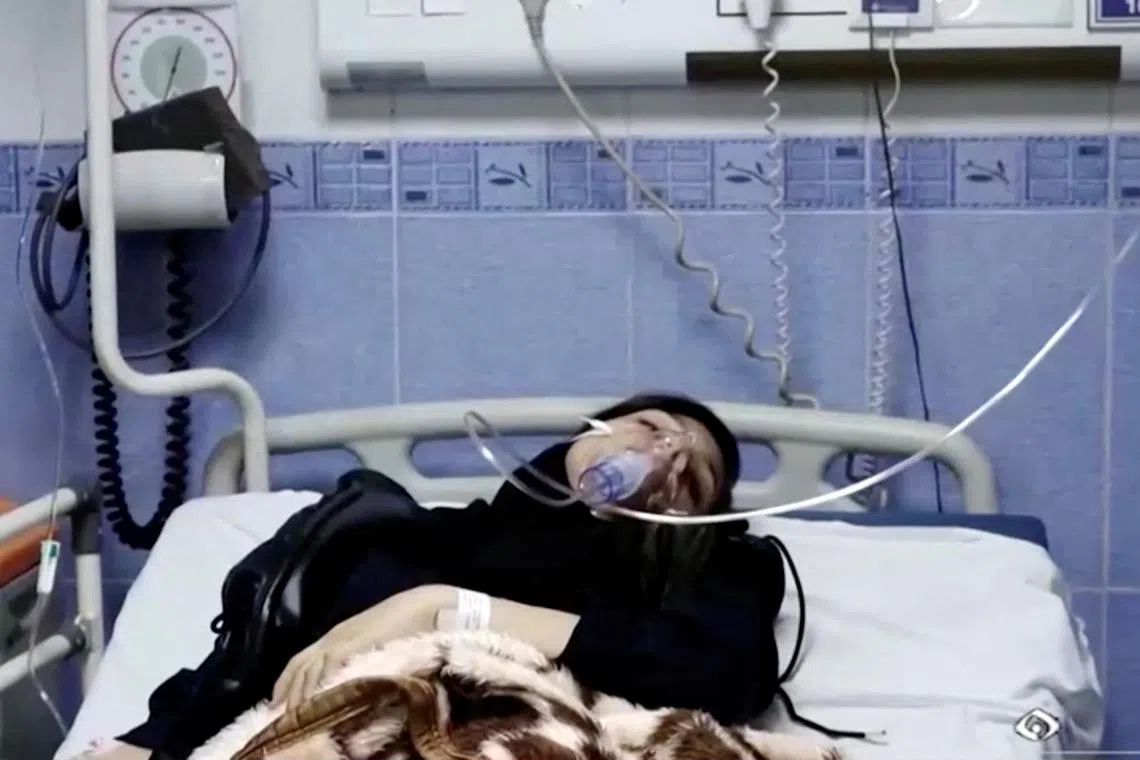Protests break out in Iran over schoolgirl illnesses
Sign up now: Get ST's newsletters delivered to your inbox

A young woman lies in hospital after reports of poisoning at an unspecified location in Iran, in a still image from video.
PHOTO: REUTERS
DUBAI - Worried parents protested in Iran’s capital Teheran and other cities on Saturday over a wave of suspected poison attacks that have affected schoolgirls
The so-far unexplained illnesses have affected hundreds of schoolgirls in recent months. Iranian officials believe the girls may have been poisoned and have blamed Teheran’s enemies.
The country’s health minister has said the girls have suffered “mild poison” attacks and some politicians have suggested the girls could have been targeted by hardline Islamist groups opposed to girls’ education.
Iran’s interior minister said on Saturday investigators had found “suspicious samples” that were being studied.
“In field studies, suspicious samples have been found, which are being investigated... to identify the causes of the students’ illness, and the results will be published as soon as possible,” the minister, Mr Abdolreza Rahmani Fazli, said in a statement carried by the official news agency IRNA.
Sickness affected more than 30 schools in at least 10 of Iran’s 31 provinces on Saturday.
Videos posted on social media showed parents gathered at schools to take their children home and some students being taken to hospitals by ambulance or buses.
A gathering of parents outside an Education Ministry building in western Teheran on Saturday to protest over the illnesses turned into an anti-government demonstration, according to a video verified by Reuters.
“Basij, Guards, you are our Daesh,” protesters chanted, likening the Revolutionary Guards and other security forces to the Islamic State group.
Similar protests were held in two other areas in Teheran and other cities including Isfahan and Rasht, according to unverified videos.
The outbreak of schoolgirl sickness comes at a critical time for Iran’s clerical rulers, who have faced months of anti-government protests sparked by the death of a young Iranian woman in the custody of the morality police
Social media posts in recent days have shown photos and videos of girls who have fallen ill, feeling nauseaous or suffering heart palpitations. Others complained of headaches.
Reuters could not verify the posts.
The United Nations human rights office in Geneva called on Friday for a transparent investigation into the suspected attacks and countries including Germany and the United States have voiced concern.
Iran rejected what it views as foreign meddling and “hasty reactions” and said on Friday it was investigating the causes of the incidents.
“It is one of the immediate priorities of Iran’s government to pursue this issue as quickly as possible and provide documented information to resolve the families’ concerns and to hold accountable the perpetrators and the causes,” Foreign Ministry spokesman Nasser Kanaani told state media.
Schoolgirls were active in the anti-government protests that began in September. They have removed their mandatory headscarves in classrooms, torn up pictures of Supreme Leader Ayatollah Ali Khamenei and called for his death. REUTERS


